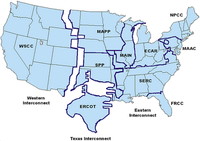-
U.S. electric power grid “inherently vulnerable” to terrorist attacks: report

The U.S. electric power delivery system is vulnerable to terrorist attacks which could cause much more damage to the system than natural disasters such as Hurricane Sandy, blacking out large regions of the country for weeks or months, and costing many billions of dollars, says a newly released report by the National Research Council
-
-
Searching social media sources by geography
Geofeedia, has created a group of algorithms that can search multiple social media sources by geography in real time; the postings, pictures, and tweets that show up in the results of a search are geolocation-enabled, are free, and results can be streamed on a mobile device, computer, or tablet. Businesses may have to pay a fee for more intensive searches
-
-
Students writing their own tickets
Four students at the University of New South Wales say they have cracked the secret algorithm used in Sydney’s public transportation system, which will allow them to print their own tickets
-
-
Georgia Tech releases cyber threats forecast for 2013
The year ahead will feature new and increasingly sophisticated means to capture and exploit user data, escalating battles over the control of online information and continuous threats to the U.S. supply chain from global sources; those were the findings made by the Georgia Tech Information Security Center (GTISC) and the Georgia Tech Research Institute (GTRI) in this week’s release of the Georgia Tech Emerging Cyber Threats Report for 2013
-
-
Increasing the efficiency of wireless networks
A “spectrum crunch” is quickly being accelerated as customers convert from traditional cell phones to smartphones and tablets; new method, which doubles the efficiency of wireless networks, was developed by researchers; it could have broad impacts on the mobile Internet and wireless industries
-
-
South Carolina exploring different cybersecurity plans
Last month state officials in South Carolina discovered a massive breach at the Department of Revenue; the attack exposed 3.6 million social security numbers of residents in the state, 387,000 credit and debit card numbers, and information for 657,000 businesses as well as other personal information; now, officials are trying to figure out what security measures they need to take in order to prevent another attack
-
-
Michigan launches Cyber Range – a cutting-edge cybersecurity training program
Michigan has launched the Michigan Cyber Range, a state-of-the-art facility that prepares cybersecurity professionals in the detection and prevention of cyber attacks; the initiative pairs cybersecurity resources with hands-on training opportunities to enhance Michigan’s protection of computer systems and sensitive data
-
-
iPhone app lets border crossers determine best time to cross U.S. border
Excessive border waits cause $2.5 billion in losses annually to the San Diego regional economy, with typical two-hour delays for trucks at commercial crossings into San Diego County costing the county $455 million in annual revenue from reduced freight activity; new “crowdsourced” information app allows motorists to decide the best time to cross the border by car or truck; the app’s information is meshed with the data on wait times at the border from U.S. Customs and Border Protection (CBP) to improve the accuracy of the wait times
-
-
Obama, Romney differ on major homeland security issues

Tomorrow, Tuesday 6 November, American voters will choose between Barack Obama and Mitt Romney as the next president of the United States; the state of the U.S. economy and the best ways to reduce unemployment and increase the pace of economic growth were at the center of the campaign, leaving little room for other issues. Homeland security issues, in particular, played little, if any, role in the campaign or in the three debates between the presidential candidates and the debate between the vice-presidential candidates; still, if we examine the policy proposals each candidate has made, and also examine the details of policies posted on his Web sites, the differences between the candidates’ approaches on three major homeland security issues – immigration, cybersecurity, and infrastructure – are considerable
-
-
New international consortium helps shape future cybersecurity practices
The Consortium for Cybersecurity Action (CCA), a newly-formed international consortium of government agencies and private organizations from around the world, will host a conference call to promote the most effective approaches to cybersecurity and support eleven key developments which are shaping events
-
-
Ensuring that software security policies reflect user needs
Researchers have developed a new natural language processing tool that businesses or other customers can use to ensure that software developers have a clear idea of the security policies to be incorporated into new software products
-
-
Dutch law enforcement wants the authority to hack foreign computers
The Dutch government plans to give Dutch law enforcement services the ability to hack into computers – not only in the Netherlands, but also those located in other countries – for the purpose of discovering and gathering evidence in cybercrime investigations
-
-
Kaspersky Lab working on a secure operating system for critical infrastructure
Antivirus firmKaspersky Lab is set to make a major contribution to the security of critical infrastructure systems by developing an operating system specifically designed for such systems; the new operating system will protect information used in infrastructure such as nuclear power plants, transportation control facilities, gas and electrical systems,and other facilities “criticallyimportant” to the economy and well-being of industrialized societies
-
-
Cybersecurity bill supporters want a vote on bill in this Congress
Last week, lawmakers and top White House officials appeared in different events, conferences, and industry gatherings to promote the cyber security bill which has been stalled in the Senate since August; administration’s officials and lawmakers supporting the bill warned that the current situation leaves U.S. critical infrastructure and businesses vulnerable to attack from hackers and spies
-
-
Experts, engineers gather to contribute to DARPA’s Plan X

DARPA’s Plan X will attempt to create revolutionary technologies for understanding, planning, and managing DoD cyber missions in real-time, large-scale, and dynamic network environments; Proposers’ Day dialogue cements program approach
-
More headlines
The long view
Researchers Develop AI Agent That Solves Cybersecurity Challenges Autonomously
New framework called EnIGMA demonstrates improved performance in automated vulnerability detection using interactive tools.
